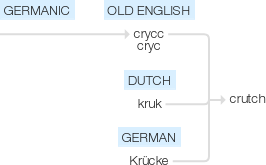Crutch
Old English crycc, cryc, of Germanic origin; related to Dutch kruk and German Krücke .
wiktionary
From Middle English crucche, from Old English cryċċ(“crutch, staff”), from Proto-Germanic *krukjō(“crutch, staff”), from Proto-Indo-European *grewg-(“wrinkle, bend”), from Proto-Indo-European *ger-(“to turn, bend”). Cognate with Scots curche, crutch(“crutch, stilts”), Dutch kruk(“crutch”), Low German krukke, Krück(“crutch”), German Krücke(“crutch”), Swedish krycka(“crutch”). Latin crucia, crucca, croccia, crocia(“crutch”), and its descendants are ultimately from the Germanic.
etymonline
crutch (n.)
Middle English crucche, "a support for the lame in walking consisting of a staff of proper length with a crosspiece at one end shaped to fit conveniently under the armpit," from Old English crycce "crutch, staff," from Proto-Germanic *krukjo (source also of Old Saxon krukka, Middle Dutch crucke, Old High German krucka, German Kröcke "crutch," related to Old Norse krokr "hook;" see crook (n.)).
Figurative sense of "a prop, a support" is first recorded c. 1600. As a verb, from 1640s.
Century Dictionary writes, "Akin to crook, with which in the Romance languages its derivatives are mingled" (Italian gruccia "crutch," crocco "hook" are Germanic loan-words).
